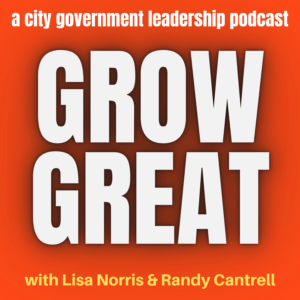
What I'm Up To At The Moment
Dateline: Dallas/ Ft. Worth & Hot Springs Village, Arkansas, September 2025
First, Who I Am & What I Do
Professional executive, leadership, and business coaching - I began doing this work voluntarily in 1997 while working full-time. Mostly, friends or acquaintances would contact me to help with specific situations. From marketing to commission structures for sales teams to succession planning, the work was primarily consulting for free. About 15 years ago, I transitioned into full-time executive and leadership coaching. Today, I'm mainly focused on coaching individuals in city government leadership.
Currently, I'm concentrating on both group coaching and private 1-on-1 coaching. You can learn more by visiting my work website (and podcast), GrowGreat.com. I currently facilitate three cohorts of executives employed by various Texas cities or people who serve city governments.
Now, Here's What's Happening With Me
One of my podcasts likely brought you here - GrowGreat.com, LeaningTowardWisdom.com, or HotSpringsVillageInsideOut.com.
My podcast topics of passion include leadership, personal development/improvement, and wisdom. And, of course, Hot Springs Village, Arkansas - my favorite place.
I'm attempting to elevate my video skills for the Hot Springs Village Inside Out show. With 26,000 acres of awesomeness, Hot Springs Village has boundless beauty to capture (and share) on video. I also want to grow our YouTube channel for that show: https://www.youtube.com/@hotspringsvillageinsideout
Favorite Quotes
Everything is hard until it's easy.
I wrote that down decades ago in a notebook without any attribution. I've researched it, but I still have no idea where I heard it or who may have first said/written it. It was instantly my all-time favorite, though, because it's true. I added to it some years ago: "And everything is slow until it's fast." There are exceptions, such as NFL quarterbacks who initially find the professional game challenging because it's much faster. Over time, with experience, they notice the game slows down, and they can perform at a higher level.
Sir Winston Churchill remarked, "All I want is compliance with my wishes after a reasonable discussion."
 Napoleon Bonaparte is attributed with this one: "Never interrupt your enemy when he is making a mistake."
Napoleon Bonaparte is attributed with this one: "Never interrupt your enemy when he is making a mistake."
Eb Dawson of Green Acres fame once said, "It's not a crime to lose all your money. It's just stupid."
Leslie Knope of the Parks & Recreation TV series brilliantly said, "We've got a big problem with the library. The library is the worst group of people ever assembled in history. They're mean, conniving, rude, and extremely well-read, which makes them very dangerous."
"Don't corner something that you know is meaner than you." -an old farmer
"Most of the trouble in the world is caused by people wanting to be important." -T.S. Eliot
"Don’t pick a fight with an old man. If he is too old to fight, he’ll just kill you." -Anonymous
Elmore Leonard, the novelist and author of Freaky Deaky, crafted this line in the novel: "It doesn't have to make sense; it just has to sound like it does."
"All you need in this life is ignorance and confidence, and then success is sure." -Mark Twain
"If you get to thinkin’ you’re a person of some influence, try orderin’ somebody else’s dog around." -an old farmer
Michael Weston, the main character in the TV series Burn Notice, said, "You just need a believable story and a lot of confidence."
“Half the harm that is done in this world is due to people who want to feel important. They don't mean to do harm; but the harm does not interest them. Or they do not see it, or they justify it because they are absorbed in the endless struggle to think well of themselves.”
―
I think Mr. Eliot got it wrong. It's far more than half.
"When someone shows you who they are, believe them the first time." - Maya Angelou
Sherlock Holmes has this bit of wisdom. "It is easy to be wise after the event."
Long ago, I concluded that my definition of wisdom is getting it right in real-time. Leaning Toward Wisdom seeks to do this largely by providing observations and insights that hopefully help us do this in our lives. Along the way, there's a fair amount of snark and chuckling.
Making A Difference One At A Time
The starfish parable was inspired by a story by Loren C. Eiseley (an American anthropologist, educator, philosopher, and natural science writer) called “The Star Thrower."
One day a man was walking along the beach when he noticed boy picking up and gently throwing things into the ocean.
Approaching the boy he asked, “Young man, what are you doing?”
“Throwing starfish back into the ocean. The surf is up and the tide is going out. If I don’t throw them back, they’ll die,” the boy replied.
The man laughed to himself and said, “Do you realize there are miles of miles of beach and hundreds of starfish? You can’t make any difference.”
After listening politely, the boy bent down to pick up another starfish and threw it into the surf. Then, he smiled at the man and said, “I made a difference to that one.”
Making a deeper, longer-lasting impact is central to ALL my work. At my age, it's different now. Time is short—always. As I age, my opportunities diminish quickly. This motivates me to consider how best to allocate my time, effort, and resources.
The ONE THING that drives me professionally is making a difference to just one. I'm not as interested in scope and scale as I am in creating a meaningful impact.
Caring Less What People Think
There's a fine line between not caring enough and caring too much. Reputation, a good name, a good example, and influence are all important and require caring.
Everybody cares about something. I care about figuring it out, getting it right, improving, and making a difference. I also care about serving God, my wife, family, and friends, including those I strive to serve in my business endeavors. Reputations aren't built on carelessness. They're built with conscious effort, deliberate behavior, and a commitment to consistency. That's why my business philosophy - first crafted when I was 27 - remains in place in my life.
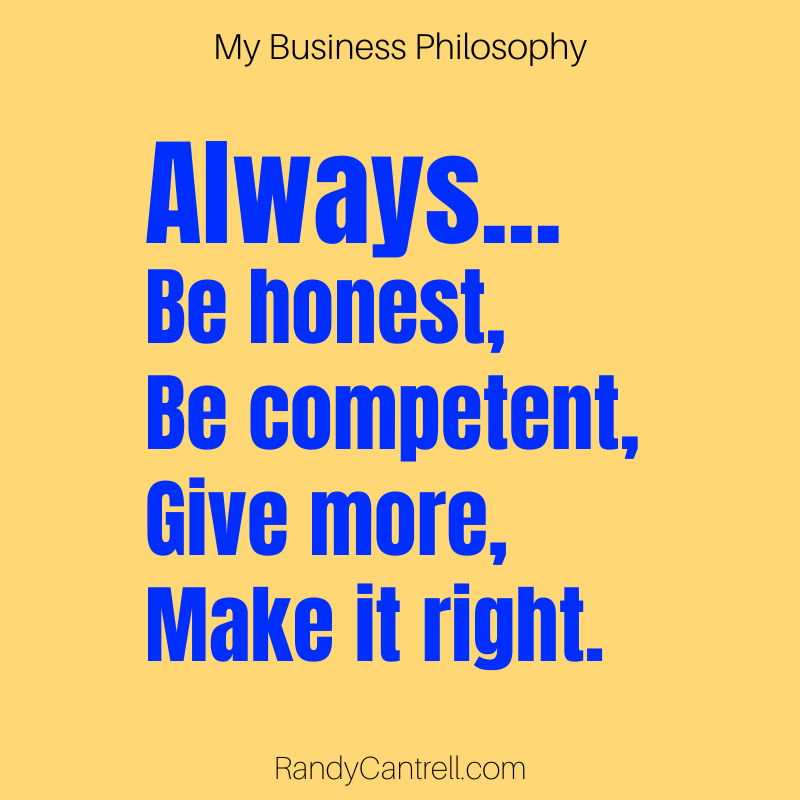
True confession: I've never cared much about what people think of me except when I know I messed up. And then it wasn't (and isn't) too difficult because I decided as a teenager to always make it right. It's easy for me to apologize and accept responsibility. I'm happy to accept responsibility for everything because it's preferable to the alternative. I'm never a victim. Ever.
Opinions. I mention this because I'm not compelled to ensure that others know my opinion. I don't care what they might think; I don't find it that important. I don't need others to share or validate my views.
But opinions differ from standing for something or believing in something. I happily share those. That's why I have a YouTube playlist of sermons, InThyPaths.com. I have detailed my worldview on my work site, GrowGreat.com. I stand for some things, which means I stand against other things. I believe in some things, so I don't believe in others. They're not all created equal. Some are weightier than others.
Caring less about what people think results from a willingness to endure the judgment of others. I'm responsible for my life. I'll answer to God for my life, so I must care what He thinks about, above all others. In line with that, I must also consider the example I set for others. I'm not too concerned about people's judgment or approval. Mostly, I've found there's little I could do about it anyway...and in the end, it doesn't matter!
I'm willing to be hated by some to be loved or respected by others. Life has taught me that others' harshly critical judgment is their responsibility, not mine. Besides, the people who likely hate me would never be the people I'd most want to surround myself with. So, it's self-selecting in my favor.
Recently, I added a component to this, focusing more on my behavior than on the behavior of others.
Intellectually, we understand that we can't control others. People say and do, or fail to do, whatever they want. We're responsible for ourselves.
I'm generally not prone to taking things personally, except when I'm among people I care about. In that regard, people are not created equal. Some people matter more to me than others, and their opinions matter to me.
Additionally, I will likely take what they say or do (or fail to do) more to heart. Sometimes, the people closest to us can hurt us the worst, and we can hurt the people we're closest to. It may stem from knowing one another so well.
Kindness is a decision. Not everybody decides to behave with kindness; self-interest often overrides it. If kindness is the rule of our lives, we all must fight hubris.
The Connection Between Spiritual & Mental Well-Being
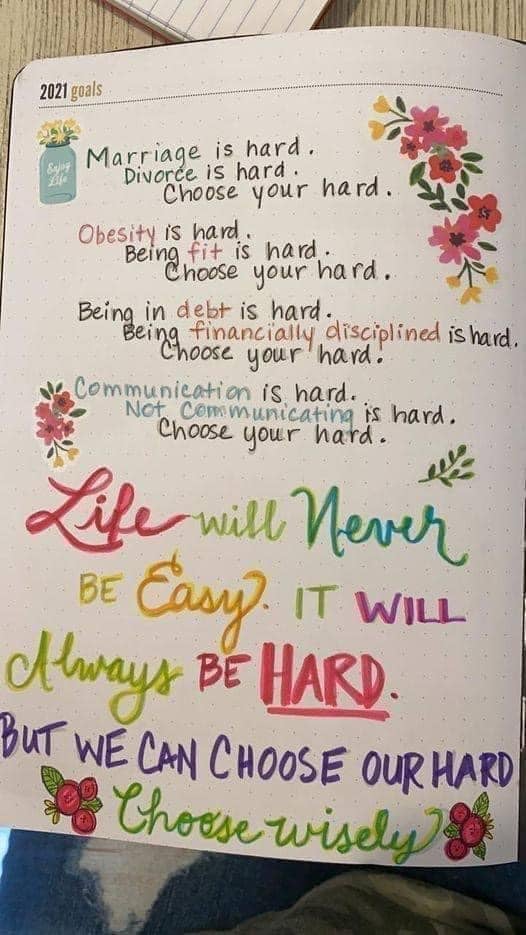
Self-denial is hard—worth it, but hard.
Temperance (self-control) is hard. Meekness is hard.
There's extraordinary power in our willingness to discipline ourselves, to resist behaving foolishly, and to resist satisfying our every selfish desire.
Someone shared this picture listing 2021 goals with me. Although I've seen this idea before, the illustration is good and true.
Some things are easy to surrender to, but the results are hard. Very hard.
Selfishness is easy. Giving in to our every desire is easy. Bitterness is easy. Hatred, too.
But when these easy things become our way of life, we find life is hard. This is no surprise because God, who created us, told us in Proverbs 13:15, "...the way of the transgressor is hard." Sin fools us into thinking it's easy, fun, and pleasurable—the path to happiness.
Romans 6:23 "For the wages of sin is death (that's eternal death), but the free gift of God is eternal life in Christ Jesus our Lord."
Comparing our lives with one another doesn't matter in our spiritual lives, and it likely doesn't matter much in any area of life except competition.
Everything is a competition. Well, almost everything.
But this eternal area of life isn't competitive at all: our spiritual lives. Measuring our status by where we stand relative to others is completely unprofitable in terms of our spiritual health. It's an area where our loss or gain has little or no bearing on others, except for the power of influence. An area where humility, submission, kindness, meekness, gentleness, grace, and compassion are highly prized because these are godly qualities that Heaven praises. Proof that heavenly wisdom is vastly superior to manmade wisdom. God's standard will judge us, not how we compare ourselves to each other.
Spiritual health is often overlooked in comparison to physical or mental health. We face this challenge when seeking short-term joy or happiness over long-term benefits. According to the Gospel of Jesus Christ, the earthly is preferred over the spiritual, the temporal over the eternal.
Matthew 16:24 "Then said Jesus unto his disciples, If any man would come after me, let him deny himself, and take up his cross, and follow me."
Ecclesiastes 12:13 "This is the end of the matter; all hath been heard: Fear God and keep his commandments; for this is the whole duty of man."
2023 became a year in which I increasingly focused on spiritual self-preservation, concentrating on better protecting my spiritual health. This meant refusing to pay attention to some things and some people. It also involves eliminating the impact of people who impose on others and navigating the things that have a destructive influence. In short, it was a protection exercise. I began 2024 realizing I needed to up my game and do an even better job.
King Solomon said, “Above all else, guard your heart, for it is the wellspring of life” (Proverbs 4:23)
That's what I'm trying to do. I'm trying to do it better than I ever have before.
Reliance on God can slip during good times, manifesting in lax prayer habits and Bible reading.
During bad times—even desperate times—people are often driven to their knees, crying out to God, searching for answers to questions they didn't even know they had when they were more fully devoted to themselves.
Around April 1, 2020, I began recording sermons (audio only) and posting them on YouTube in a playlist titled "In Thy Paths." To access the playlist, navigate to the menu and click the link 'In Thy Paths'.
Mental health - at least for me - can't be viewed separately from spiritual growth (and health). That's because we serve God first with our minds. Until a person responds appropriately to the Gospel by putting God first, serving God isn't possible. It's why the Lord repeatedly admonished us to "deny yourself." Self-denial is a decision that leads to action. The power of a mind made up is manifested whenever we commit to spiritual growth.
Spiritual growth and mental health are congruent. Increasingly, I'm aware of how my frame of mind impacts everything. I believe we're each responsible for our own lives. For guarding our hearts. I don't accept the notion that we're merely puppets subject to the impositions of others. No matter who is at fault or who is to blame, we're responsible for what we think, believe, feel, and behave. Bad things happen to all of us - sometimes horrible things beyond our control - but we can decide how to respond best. Moving forward or cowering in the corner are options. It's up to us to decide. I don't claim always to get this—or anything else—right all the time.
Brevity Is Hard Work, But Worth It
I'm increasingly impatient with public rambling. Private 1:1 rambling is less burdensome to me. The person who gets up in front of a group and can't articulate their thoughts clearly or figure out when to stop talking frustrates me. Some public speakers don't know how to dismount. They're holding onto the bar, swinging around and around, unable to let go and stick the landing. While most of us who stand in front of a crowd have done it, some consistently do it 100% of the time. I'm highly motivated to avoid being among their number.
“I have only made this letter longer because I have not had the time to make it shorter.”
— Blaise Pascal, mathematician and physicist
“Not that the story need be long, but it will take a long while to make it short.”
— Henry David Thoreau, writer and philosopher
“If you want me to give you a two-hour presentation, I am ready today. If you want only a five-minute speech, it will take me two weeks to prepare.”
— Mark Twain, writer, speaker, and humorist
Preaching
“The secret of a good sermon is to have a good beginning and a good ending; and to have the two as close together as possible.”― George Burns
Personal Communication, including face-to-face, Zoom, phone calls, texting, messaging (whatever platform)
Writing
Podcasting
They're all now under more serious scrutiny.
While I don't want to overthink it, I want to be more intentional, thoughtful, and purposeful.
Do you know the guy who loves to use 100 words when 10 will do? Yeah, me too. I've never wanted to be THAT GUY. Instead, I'd like to be the guy who finds a way to use 6 instead of 10.
Don't judge my effort by this page. 😀
Practical Minimalism, Curbing Consumerism & Contentment = High Utility Living
I started purging possessions in July 2022, determined to eliminate at least 80% of everything I owned. I underestimated my commitment and ability to declutter. I've likely eliminated over 90% of my possessions (clothes, books, etc.). It's among the most liberating things I've ever done.
When I began the process, I decided how to determine what to keep. I'd ask a few questions:
1. Do I use this regularly?
2. If I don't, when was the last time I used it? (if I hadn't touched it in a year or more and it didn't provide some other value, out it went)
3. Is it sentimental, a keepsake? If so, do I want to hang onto it?
That got the process moving forward. Right away, I started asking about the utility of things. Were they high utility?
That question arose as I examined items like furniture, and then it spread to almost everything. Some fixtures and furniture in my spaces were not particularly useful. They took up space and provided hiding places for clutter. I determined that I'd part with something that wasn't high in utility. By the end of the first week of my purging, high-utility living became my mantra, driving almost all my choices.
I'm entering a new phase, the encore chapter, where I'm growing increasingly pickier about the things that occupy space in my life. Certain items, such as audio and video equipment and storytelling tools, have increased in value. I'm pursuing those activities more vigorously, so it makes sense that I should up my game.
But I'm diminishing my interest and activities in almost every other area. The result? I care less, and with less care comes the offloading of even more stuff.
Coupled with that is the growing awareness of my consumerism. This was accelerated after we made a couple of moves requiring us to get rid of some things, which prompted us to need other things. When we sold one house, we left behind a washer and dryer that were in perfect working condition, although they were a decade old. We included them in the sale of the house. That house had a built-in Sub-Zero refrigerator. Moving into another house required the purchase of a new washer, dryer, and refrigerator—all big-ticket purchases. Smaller ticket purchases were needed, too.
I didn't begrudge these purchases, but spending money to buy things seemed too frequent for a while. So, I set about slowing things down—and I'm still determined to do that even better!
Social media isn't helping. Targeted ads are common because they work. Social media networks know what we love most and cater to our interests. I hide ads more regularly than ever before to avoid being tempted. More and more, I'm asking myself, "Why do I need that?" More and more, I have no answer, which is all I need. Just say, "No." 😉
Contentment begins with gratitude. I am grateful for what I have, including my possessions. I am thankful enough to make the most of what I already have, rather than dwelling on the many things I don't have. That might be nice. It is unnecessary and perhaps even useless, but it is nice.
I boil it all down to high-utility living. That means the things in my life need to be high-utility—very useful, commonly helpful, regularly beneficial, and useful. If not, then I have to question its place in my life.
Laughter + Music = A Happier Life (and tears, too)
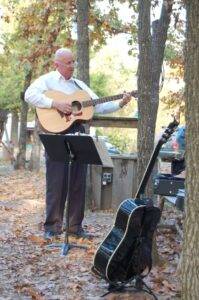
Stanley James Elmore was my lifelong best friend since boyhood. He was born on April 11, 1957, about a month before I was. Our parents were friends, and until he passed away in the early morning hours of May 12, 2013, I had never lived a day on earth without him. That's him playing the guitar and singing. Laughter and music were significant components that united us. Mostly, it was love—the kind of love buddies have because we enjoyed being around each other.
I think of him often. A few days ago, I started dwelling on our times together. It occupied me all day long. Smiles displaced Melancholy as I reminisced about all the good times. This year, it'll be 12 years since he left this world. We were both 56 when he died. We both figured we'd be old men together, but it didn't happen. I'm growing old without him, but our 56 years together made me think about laughter and music. Laughter and music have been an integral part of my life and remain so today.
It's not planned or scheduled, but I laugh and cry daily. And music? Well, I listen to a boatload of music daily. I highly recommend it. It makes my life better and happier.
Hi-Fi & Health
They are only related because I'm putting them together. And I'm putting them together because I enjoy their connection.
My love of hi-fi gear goes back to junior high. First came a love of music, specifically, records. I'm not sure what sparked my fascination with great stereo systems, but if you've never heard a hi-fi system that made your mouth drop open because it was so realistic, then you haven't experienced great hi-fi. I've heard some spectacular systems through the years, but nothing has quite captivated me like some speakers made by a long-distance buddy in South Carolina, The Horns.
About 20 years ago, I bought a pair and invested way too much money because the hi-fi bug had bitten me hard. The speakers were among the least expensive components in the system (less than $ 1,000). I added multiple amps to drive them, each providing a slightly different sound. A modified, tube-output stage, SACD player provided extraordinary vinyl-like sound. It was jaw-droppingly good.
Then, because I didn't have a suitable room to set it up, I sold it all.
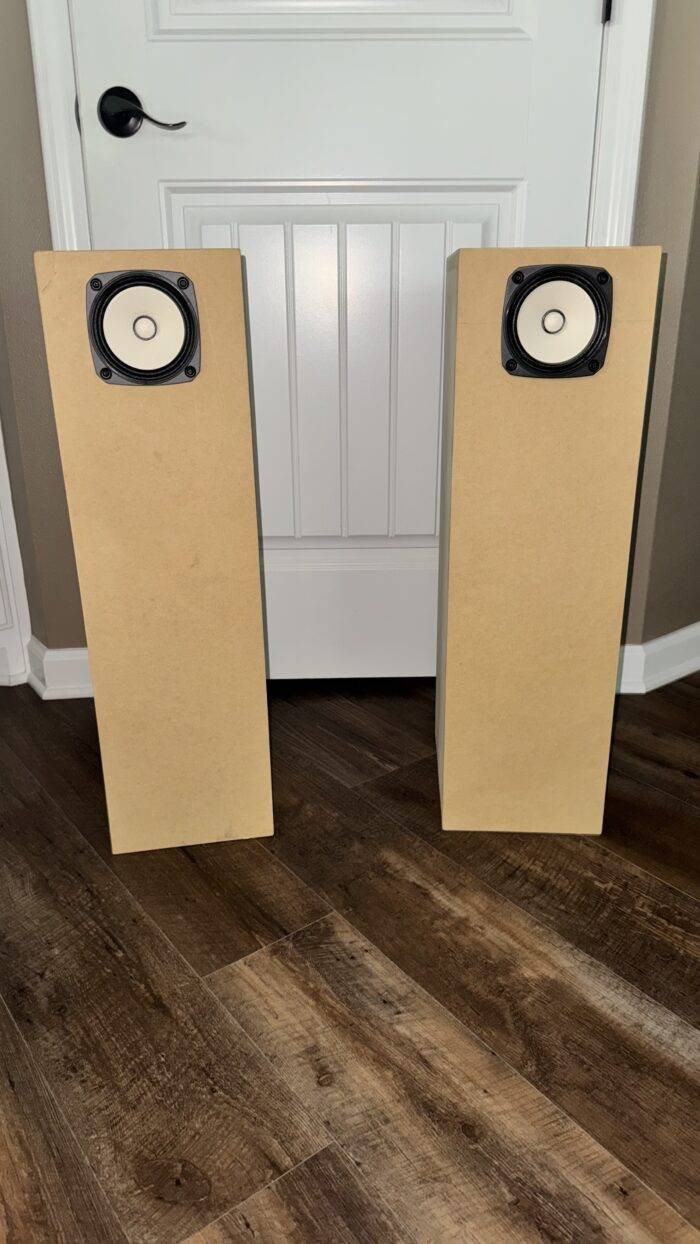
Until the lifelong bug returned, prompting me to crave another set of The Horns. Sadly, the architect of The Horns, whose father made the cabinets, had ceased production due to the passing of his father. Armed with some details provided by the architect, I managed to have another buddy (this time one more local) build me a pair. I just received them a few days ago via the cab of an old pickup truck. That's them pictured to the right.
They haven't seen any power yet because I haven't assembled the electronics to drive them. However, I expect to have some much-needed high-end equipment back in my life soon. I'm sure I'll update you with more details as time moves along (for those who may be interested). My teenage years spent selling stereo gear have never left me. Hours spent in listening rooms playing records for shoppers trying to decide whether or what to purchase were some of the most fun a kid (or old man) could have.
Ten years or so ago, I first encountered a carnivorous way of eating. Long before the keto movement was quite a thing. No-carb or low-carb diets have proven successful for many people battling obesity and other ailments, including diabetes. I suppose many of us have done some version of "keto."
Some months ago, following having both knees scoped (torn meniscus due to age, wear and tear), I struggled. Just not feeling very well. The Pandemic had ruined my gym habit, causing the gym chain I belonged to for years to file for bankruptcy. Not sick, but hardly feeling my best.
As with most significant changes, we often reach a crossroads where we're sick and tired of something - that's when we make up our mind. We'll either fight or surrender. I made up my mind to fight. I decided to go "carnivore" in my eating for 90 days. Labor Day ended the 90-day trial. News Flash: After 2 weeks on that "diet," my knee pain went away completely. It was remarkable. I'm now going to figure out how to approach my future with a greater sense of permanence.
Like my renewed pursuit of good hi-fidelity, I'm driven to pursue improved health, which includes feeling better more consistently. Stay tuned.
When I Die
Death is important. But first, there's life.
About 15 years ago, I created a shared Dropbox folder with my wife called "When I Die." I have a working document in that folder outlining what I want to happen when I die. The details aren't important here, but are important for my wife and family. While I'm alive, they matter to me, but I realize that when the realities of that document come to pass, I won't know or care. I'll be somewhere else, far away.
The death of my mother in early April 2024 prompted an update to the document. Every death that impacts me seems to prompt more edits to the document.
Death is too important to ignore. Specifically, our death is important. I know my death will be a reflection of my life, though, so my daily choices matter. How I treat others, behave myself (or fail to), influence others, and serve others - these are the things that matter. How I glorify God will matter because He's who I'll face when this life is over. So, admittedly, I think about my death. It'd be foolish not to.
Check out some of my sermons at In Thy Paths. Better yet, check out some sermons by a much more talented preacher, Kevin Presley (a gospel preacher currently based in LaGrange, GA), at Let The Bible Speak TV. However, first, permit me to introduce you to a lifelong mentor who passed away on February 20, 2019. He was a gospel preacher whom I had known all my life. He served me during some of my most challenging and rewarding moments. His name was Barney Owens. He preached this sermon on April 4, 2010: "And he died."
That about sums it up. What about you? What are you up to? I'd like to know. Contact me here.



